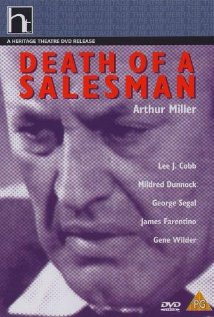| Death of a Salesman | |
|---|---|
 DVD cover | |
| Genre | Tragedy |
| Based on | Death of a Salesman 1949 play by Arthur Miller |
| Written by | Arthur Miller |
| Directed by | James B. Clark Alex Segal |
| Starring | Lee J. Cobb Mildred Dunnock James Farentino George Segal |
| Music by | Robert Drasnin |
| Country of origin | United States |
| Production | |
| Producers | Daniel Melnick David Susskind |
| Running time | 100 minutes |
| Production company | CBS |
| Original release | |
| Network | CBS |
| Release | May 8, 1966 |
Death of a Salesman is a 1966 American made-for-television video adaptation of the 1949 play of the same name by Arthur Miller. It was directed by Alex Segal and was adapted for television by Miller. It received numerous nominations for awards, and won several of them, including three Primetime Emmy Awards, a Directors Guild of America Award and a Peabody Award. It was nominated in a total of 11 Emmy categories at the 19th Primetime Emmy Awards in 1967. Lee J. Cobb reprised his role as Willy Loman and Mildred Dunnock reprised her role as Linda Loman from the original 1949 stage production.
Contents
Playbill markets this version of the play as an "abbreviated" one. [1] Although the performance is abridged, it was adapted for television by Miller himself, meaning that not much substance was lost in the changes. [2] [ user-generated source ] The production was taped after several weeks of rehearsals. [3]
It was a 1966 CBS television adaptation, [4] which included Gene Wilder, James Farentino, Bernie Kopell and George Segal. Cobb was nominated for a Primetime Emmy Award for the performance. Mildred Dunnock, who had co-starred in both the original stage version and the 1951 film version, again repeated her role as Linda, Willy's devoted wife, and earned an Emmy nomination. In addition to being Emmy-nominated, Cobb and Dunnock were nominated for a Grammy Award at the 1967 ceremony in the category of Best Spoken Word, Documentary or Drama Recording. This teleplay is one of several adaptations of the play and was contemporaneous with a May 1966 BBC version starring Rod Steiger and produced by Alan Cooke. [5] [6]
The production marked the acclaimed reunion of the leading actor and actress from the original 1949 broadway cast. [1] [2] The performance also marks a strong dramatic turn for George Segal who is known for his comic work, while a young Gene Wilder presents a comic but sensitive performance as Bernard. [2] [ user-generated source ]